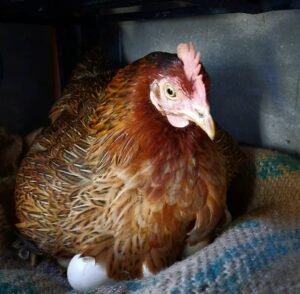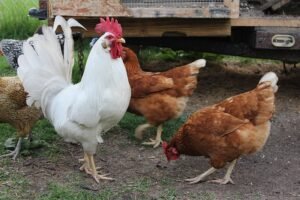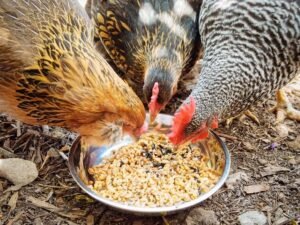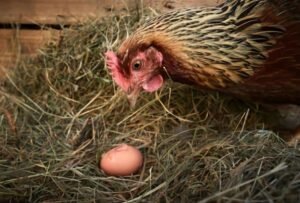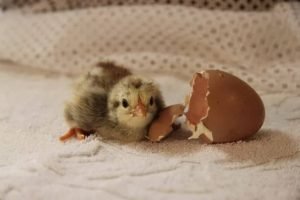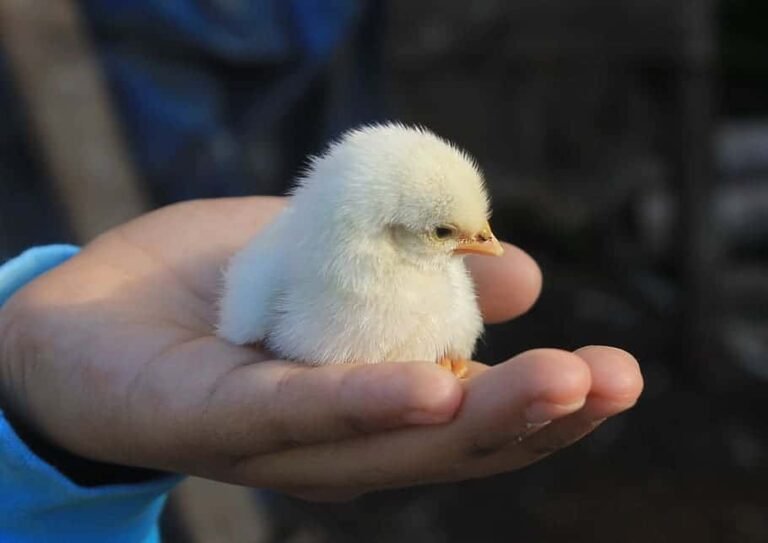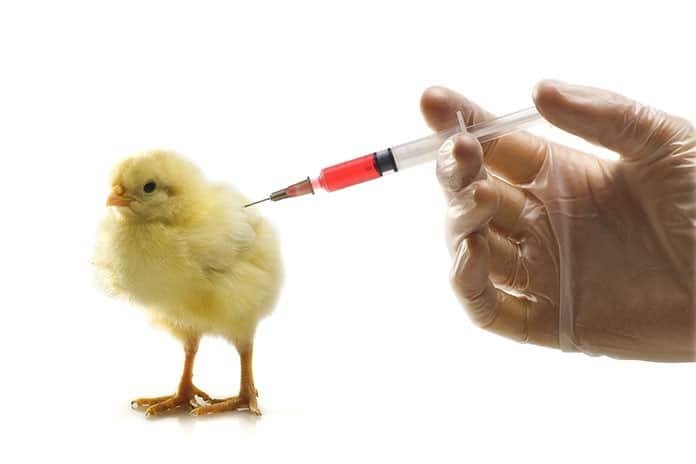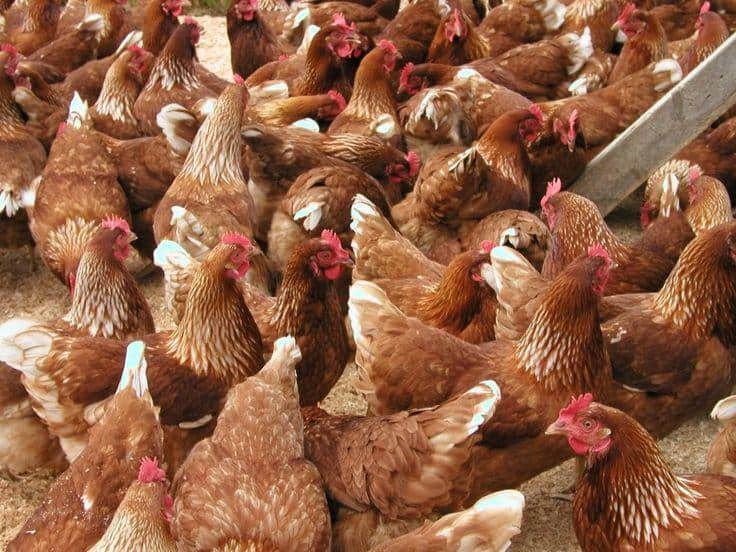How Do You Get Rid of Worms in Chickens?

One of the most common questions poultry farmers ask is “how do I get rid of worms in chickens?”
In fact, the majority wonder, as I used to, “how do worms get inside a chicken’s gut?”
Do a part of the chicken’s intestine metamorphose to worms?
Where do they originate from?
Usually, the endpoint of these thoughts and confusion is “how to send the worms packing”.
Let’s say you’ve done all you could, yet the worms are still around and you want to get rid of them.
This guide will help do that in easy steps.
Beyond that, it will help you with the necessary practice to keep the worms away, thereby increasing the productivity of the flock.
Also, you will find out what they are, how to know and deal with the symptoms and how to prevent them
This and many more you will find out if you read till the end.
What are chicken worms?
I am not going to blind you with all the Latin and botanical names, obviously, there are plenty of books and web pages to do that.
Simply put, worms are relatively small elongated naked and soft-bodied endoparasites that invade the guts of humans, chickens, ducks, turkeys etc.
Although many think that worm infestations are one of those things that chickens get, it should be dealt with before they become life-threatening.
Where do chicken worms come from?
Contrary to popular opinions, worms do not emanate from the chicken guts.
They are can be transmitted to a healthy chicken through so many ways such as;
- Transfer from an intermediate host.
- Chickens can pick it from another bird coughing. (Do chickens cough? Yes they do)
- Also, worms can get into a chicken body when a chicken picks up worm eggs from scratching the earth.
- In addition, chickens can get infected if you leave them on the same small area of ground for long.
- Also, chickens get infested by worms when they eat or drink unclean and contaminated food or water.
So, now you know, your chickens do not just get infected by worms.
Either of the above could have been the source of infestation.

Should I be worried about chicken worms?
Absolutely!!!
You should be freaked out at the mention of chicken worms.
Chicken worms do not come or leave a good impression on your chicken breeds.
In any kind of poultry, worms will not leave the chickens in good shape.
When there is a worm infestation, here’s what you get;
1. The chicken’s health will deteriorate.
Worms impair the health of the birds drastically.
Because they are parasites, they take up all the nutrients out of the food of their hosts.
In turn, the birds will lose weight.
And most times they will not grow at the rate they should regardless of what you feed the chickens.
2. Worms damage a chicken’s digestive tract.
Basically, worms live in the intestinal region where the digestive tract runs.
Through their sucking and nutrient consumption, they can damage the digestive tract of the birds.
This in turn can lead to other infections.
3. Worm infestation leads to a reduction in egg production.
The presence of worms denotes that the chickens are feeling unwell.
And with the destruction of the digestive tract, the infected chicken will not have all the necessary nutrients required for them to lay eggs.
This decline will lead to a decline in how many eggs the chickens lay in a week and all year round.
4. Presence of worms = Decline in general well being
Chickens that are infested will totally seem ‘unwell’ and listless.
Most of them will withdraw from the crowd, losing excitement and appetite.
So, on a general note, chicken worms do not come with good news, that’s why many resort to getting rid of them as soon as they notice.

What kind of worms affect chickens?
Basically, there are different types of worms in the biological space but our concentration is mainly on worms that affect chickens.
Learning about the type and life cycle of chicken worms may not be interesting but it is one of the most common ailments you can encounter on your farm.
There are 3 main internal parasitic chicken worms that affect poultry.
They are the roundworms, tapeworms and gapeworms.
1. Roundworms:
Roundworms have a look like that of spaghetti.
Usually, they affect chickens, ducks, turkeys and geese.
I think they are the most dominant worms because they follow a direct life cycle.
What this means is that an infected chicken will release worm eggs in its dropping.
Once another bird or an earthworm picks up the eggs, they become infected.
Roundworms have a life cycle of 28 days and are 3 inches long when mature.
Beyond the intestines, they live in the crop, oviduct, gizzard and oesophagus.
2. Gapeworm:
Unlike the roundworms, the gapeworms live in the trachea where they impair the breathing of the chickens.
This set of chicken worms affects the young birds and they can be fatal if you do not get rid of them.
Majorly their intermediate host transmits them.
Also, snails, earthworms and slugs can all be carriers of larvae of gapeworms.
Once birds ingest it, they become carriers.
Gapeworms have a life cycle of 14 days.
3. Tapeworm:
Here’s another worm that affects chickens you need to get rid of: tapeworms.
Although they are less common, a heavy infestation can reduce the chicken’s ability to fight other infections.
Tapeworms look like ribbon segment worms that attach themselves to the intestinal wall by burying their heads into its lining.
Slugs and snails transmit them.
If your chickens are free-range, they are more susceptible to tapeworm infestation than indoor birds.
Tapeworms are very microscopic and have a life cycle of 6 weeks.
So, when you notice that your chickens are infested by worms, it could be either of the 3 above.
But how do you know your chickens have worms?
Find out below!!!
How do I know my chickens are infested by worms?
Fact is, it can be really hard to tell if your chickens h worms.
However, a few signs can tell you.
Here’s how to know that your chickens add worm-infested;
- A chicken with worms will go off lay.
- Also, they may show signs of diarrhoea.
- Chickens that h worm will eat more food than they usually do. This shows more than one entity is sharing his diet.
- In severe cases, they will lose weight.
- If they are infested by gapeworms, such chickens will stretch their necks gasping for air.
- Poor weight gain in meat birds and young pullets
- Also, you will notice ‘Threads’ in egg whites – these are actually hairworms.
- Yolk in egg is a pale colour
- Also, the vent feathers may appear dirty
- A decline in egg production not caused by age or other factors.
- Also, their poo will contain worm eggs. That’s a blaring alarm there!!!
Although it can be hard to tell, these few signs will show you that something is wrong.
And it has to do with worms!!!
Despite those signs, we recommend you practice the prevention techniques we shared below and also regular deworming is important.

How do I get rid of worms in chickens?
Now that you know what worms are and where they come from, how do you deal with a worm infestation?
To get rid of worms in chickens, you have to follow a strategic process to prevent further damages than the ones already caused by worms.
Here’s what you can do;
1. Treat the birds using a recognised and licensed poultry wormer:
Once you notice worm infestation in your poultry first you need to consult a vet if you want to explore the medical option.
Most vets will recommend a recognised, licensed anthelmintic such as Flubenvet or Solubenol.
Basically, these two are the only poultry wormers that the Animal Veterinary Medicines Authority licence for poultry use.
However, other poultry wormers though not licensed include Ivermectin drops and Piperazine.
Do not administer this on your own accord if you do not want to experience high mortality.
However, seek a prescription from a vet, or have to complete a POM-VPS declaration form on a website that has an SQP (Suitably Qualified Person) to dispense the drug.
Kindly note that this option gets rid of all types of chicken worms.
2. Use herbal products to get rid of worms in chickens:
If you want to adopt a more natural option in deworming your chickens, then you have to explore the use of herbal products.
You can make do with Verm-X.
The good news about this deworming option is that no license is required and it contains no ‘chemicals’.
But on the flip side, herbal products do not kill Gapeworm.
This makes it a no go option for poultry farmers whose flock is infested by tapeworms.
3. Introduce battles of easyverm parasite pellets.
Another option to explore when you want to get rid of worms in chickens is feeding the infected chickens Battles Easyverm Parasite Pellets.
All you have to do is to add these pellets to the chicken feed for 1 week a month.
4. Move the chickens to a fresh sanitizer environment.
Do I have to move the chickens?
Well, it’s a viable option because chances are that the infected chickens must have dropped faeces containing worm eggs.
And that invariably means that the environment is worm-infested.
That also means that regardless of how many times you treat the flock using the poultry wormer or herbal products, they will pick up worms from the environment again and again.
Therefore, you can get rid of worms totally by moving the chickens to the fresh ground regularly using a ground sanitiser to prevent the build-up of worm larvae.
5. Use ground sanitising powders.
Another option to get rid of worms in chickens is to use ground sanitising powder.
All you have to do is get it from a recommended poultry farm equipment store.
Then sprinkle it regularly on the poultry ground.
This will kill the worms from the larva stage to full growth.
You can explore this alternative if it’s impossible for you to move your flock to a new ground.
How do I prevent further worm infestation on the farm?
You will agree with the old-time adage which says that “prevention is better than cure”.
Going through the rigours of treating and deworming chickens can be quite a task.
Besides that, it will affect the productivity and delivery of the birds which in turn affects farm production.
Here we have buttressed simple preventative measures you can adopt to prevent worm infestations.
This can save you a great deal of worry and the loss of birds.
Here’s what to do to prevent worm infestations;
1. Clean the poultry ground regularly:
Do not allow the birds to stay on bare sandy grounds for a long time.
Sandy areas harbour a lot of worms, bacteria and potential infections.
Try adopting a kind of ground that you can easily clean using a disinfectant.
2. Disinfect the area using a ground sanitiser:
Once the ground is dry, spray a ground sanitising powder to kill the worms if there are any left.
3. Add Apple cider vinegar to the birds drinking water:
The use of apple cider vinegar will not only help you to get rid of worms from chickens, but it also changes the acid balance in their gut.
This makes their guts less hospitable and accommodating for worms to live and breed.
All you have to do is add one teaspoon per litre of water.
4. Cut the grasses short:
One of the ways to prevent worm infestation is to keep grass relatively short.
Why?
Of what use is that?
Sunlight destroys worm eggs.
So the shorter the grass, the more scorching the sun will be on the worm eggs.
And that means the worm eggs will die off with time.
5. Restrict your chickens from mingling with other birds from other packs:
Worm infestation can be a product of mingling with other infected birds.
So you might want to keep an eye on your birds if they are free-range.
6. Monitor the bird’s food and water:
Most times birds get infected by drinking unclean water or contaminated food.
Therefore, we recommend you supply them with clean fresh water and fresh feeds.
Also, consider feeding them with more healthy diets such as fermented feed or organic feeds.
Ensure they are clean and fresh.
Frequently asked questions about how to get rid of worms in chickens
Can birds live with chicken worms?
Yes, birds can live with chicken worms.
However, how long it can live with worms in their gut, intestines and trachea is not known.
Depending on the chicken breed, some breeds can live with worm infestation longer than others.
However, it can result in a decline in egg production and weight loss.
Therefore, we recommend you get rid of the worms in the chicken as soon as you notice.
Are herbal products more effective in deworming chickens than poultry wormers?
Currently, there is no fact surrounding that claim.
The opinion is divided as to the effectiveness of herbal products against Flubenvet the poultry wormer.
What we do know is that both can deworm birds just that herbal products do not get rid of some type of chicken worms.
Chickens eat worms, how do they get infested by worms?
Of course, chickens love to eat worms.
In our article on what do chickens eat, we recommend worms as one of the nutritious foods for chickens.
But unfortunately, that’s not the kind of worms that infect your flock.
Chickens are infected by parasitic worms, not the kind they eat.
Summary
Worm infestation is not good news, therefore it is important to get rid of them and prevent further infestation on the farm.
We hope this helps you get rid of these disturbing creatures.
If you’ve ever handled a worm infestation on your farm, how did you do that?
Tell us in the comment section, we will love to hear from you.
References
- 12 Best Chicken breeds for Eggs – chicken breeds for eggs
- When Do Chickens Start Laying Eggs Regularly?
- How Many Eggs Does A Chicken Lay In A Week?
- Fermenting chicken feed – The definitive guide
- 10 Sure Ways To Stop Chickens from Eating Their Eggs [+Bonus]
- 6 Best Chicken Egg Incubators for Chicken Eggs and Other Birds
